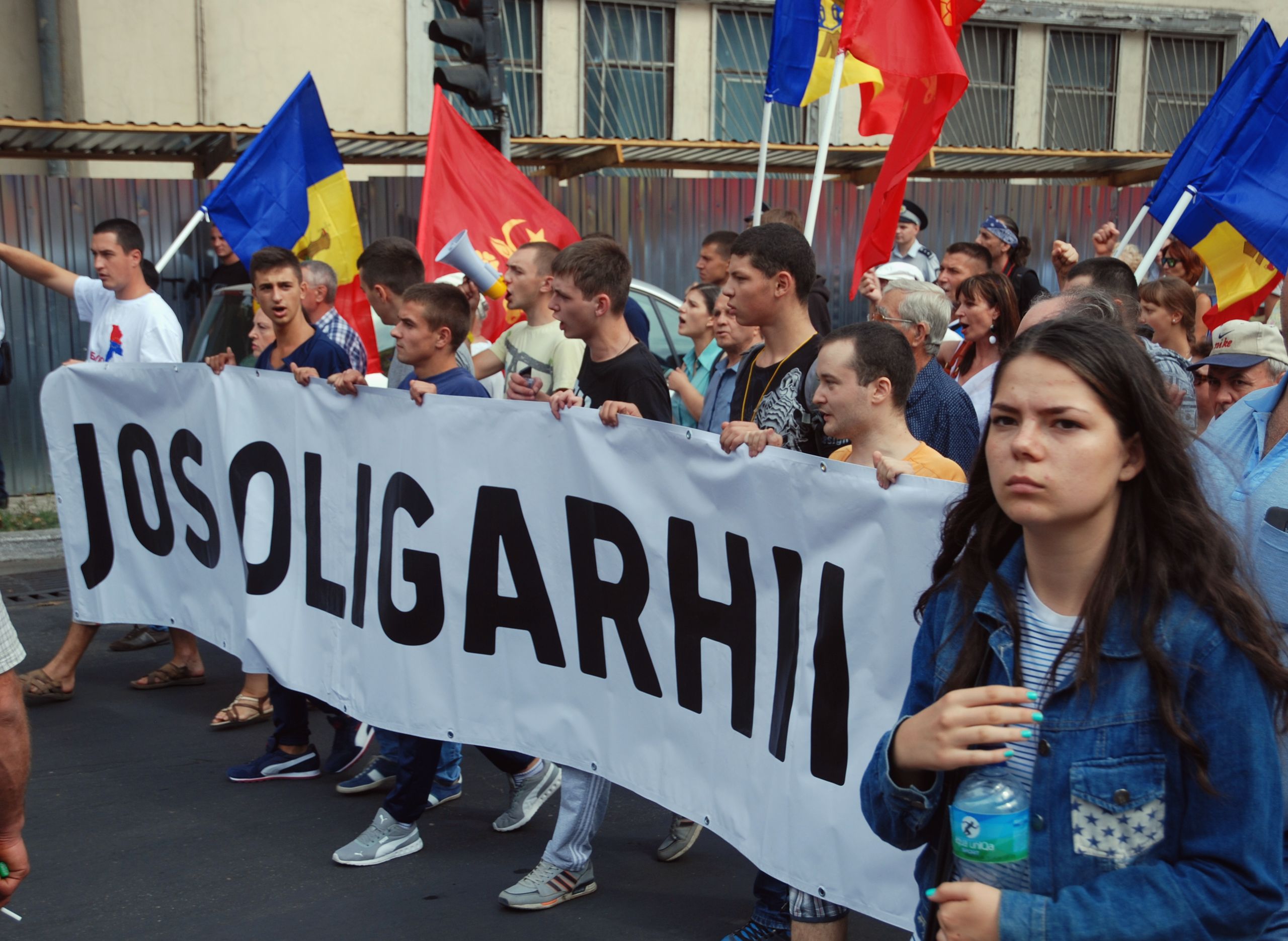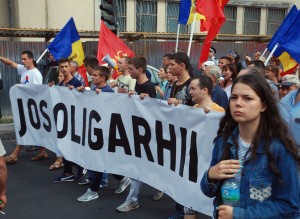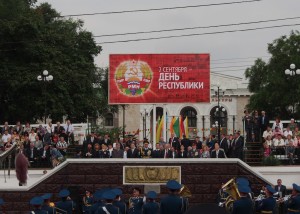Back to the Old Country – Moldova’s Political Crisis
 Protestors in Chisinau demanding an end to nepotism and corruption.
Protestors in Chisinau demanding an end to nepotism and corruption.
Politicians and Priests preaching from a stage to a sea of enraged folk, military tents scattered along the dug up cobblestone, EU and Russian flags from end to end – contrary to the resemblance, this is not Kiev’s Euromaidan, but Chisinau’s Stephen the Great Boulevard. Over 15,000 citizens of Moldova’s capital flooded the streets last weekend to protest the appointment of Pavel Filip and the country’s third government in less than a year.

Unlike Euromaidain (roughly translated to “European Square”) where Ukrainians demanded the country toss the shackles of pro-Russian oligarchs, protesters on Stephen the Great boulevard are of a more mixed sort. They include convictions from both the pro-Russian and pro-European side of the Moldovan political scene; joined by the common goal of restoring order and eradicating corruption from the former Soviet Union’s most Western country.
The war in Ukraine and its consequences continue to disturb the European Union, United States, and NATO. Now the spotlight has shifted to the Republic of Moldova, Europe’s poorest country per capita. In the wake of recent political turmoil, Western policy makers now fear the country could face a sharp turn away from European integration, back into the arms of the Kremlin. For this reason, Western countries closely aligned with the United States are willing to do anything in their power to maintain amiable structures in Moldova and oppose Russia’s ever-present hand.
The West’s policy towards Moldova may benefit Washington and Brussels, but the people of Chisinau have paid their toll. With foreign wind in their backs, the politicians of this former Soviet Republic have created a country where the average wage does not surpass 200 Euros, making Moldova Europe’s poorest country.
While residents of Moldova barely scrape by, wealthy Moldovan oligarch Vladimir Plahotniuc has monopolized the aid patient state. “Chisinau’s Silvio Berlusconi” and “Moldovan Donald Trump” are just some of the nicknames that orbit the main streets of the Moldovan capital for this mysterious billionaire. Many see incumbent Prime Minister Filip as a political extension of Plahotniuc’s state capture. Moldova’s political crisis has been spiraling since a 2014 corruption scandal in which $1 billion, nearly 13 percent of GDP, disappeared overnight. Coincidentally the scandal happened to hit headlines only days before the country’s leadership signed what was meant to be a “game-changing” association agreement with the European Union. Furthermore any EU related news is from thereon often attributed to Plahotniuc’s grip on politics.

With growing despair towards Brussels, in comes Russia. If you were to ask any citizen of the Former Soviet Union what their first association with Moldova would be, nine out of ten times you would hear “wine”. In 2005 Russia banned the import of Moldovan wines, under the auspices of sub-par quality. However, many Moldovan will confess that the real reason was not the quality of their grapes, but the sour taste of a former Soviet Republic leaning westwards in Putin’s mouth. Since independence in 1990, Moldova has waged an endless series of diplomatic wars with the Kremlin. The brunt of contention has revolved around the alleged Republic of Transnistria where the majority Russian population declared de jure independence in 1990. Russia deployed a peacekeeping mission of 2,400 troops in the early 90’s and initially agreed to withdraw all forces by 1998. Moscow has since removed a good deal of heavy weaponry from the breakaway region but maintains a similar sized force. Transnistria has transformed the “capital” Tiraspol into a real haven for laundered Russian money, creating a region where the standard exceeds that of nearly any Moldovan. An unnamed worker within the Moldovan Ministry of Defense was willing to share what it is like to live next to Russia’s pet state. When the worker’s niece was hospitalized in Tiraspol for a leg fracture sustained at a sporting event, she received a lunch box from the hospital staff. Inside the lunch box she found regular portions of jaffa cake, various chocolate bars, 800 Russian rubles, and a letter with the Russian emblem. The letter was addressed “from the Government of Russia to our dear friends in Transnistria. The people of Russia have not forgotten you”. It seems that nobody goes to the local pub without big Vlad knowing their draught of choice. With a significant proportion of exports headed to Ukraine and Russia, Moldova’s economy sees to stagnate this term, following the economies of their two largest trade partners. In addition, Moldova’s economy is almost completely dependent on energy sales from Russian gas monopole, Gazprom. While those in Chisinau struggle to afford costly heating bills, the citizens of Tiraspol hardly pay a thing . After being present the numbers, even ‘Joe from under the bridge’ could tell you that Moldova will have an extremely difficult time going anywhere without Moscow’s blessing.
A brief glimpse over Stephen the Great’s Boulevard and it would seem to the naked eye that this is not, in fact, the unified rally of those opposing corruption many tend to portray. The Russian tricolour very clearly outnumbers the 12-starred golden wreath. However, excluding the storming of Parliament on January 27th the situation has thus far been remained passive and opposition firm in declaring unity. While in Chisinau, for the time being, pro-Russian and pro-EU supporters stand alike, the powers of both East and West continue their centrifugal pull. The Balkans may wear the title of ‘powder keg’ like a champion, but with vital geostrategic and economic interests from both sides and a Russian contingent within Moldova’s borders, all it would take is a single spark to reignite conflict.
Washington and Brussels will not let Chisinau fall to the Russians lightly. However, this time around there is no need for ‘little green men’ for they have already been there since 1990 and do not seem to be going anywhere soon. Could we have another Ukraine situation on our hands? Perhaps Moldova’s Socialist Party leader and avid Pro-Russia advocate Igor Dodon provided the best analysis of the situation. “Nobody wants blood, but the clock is ticking and we want to go home, back to the U.S.S.R”.
